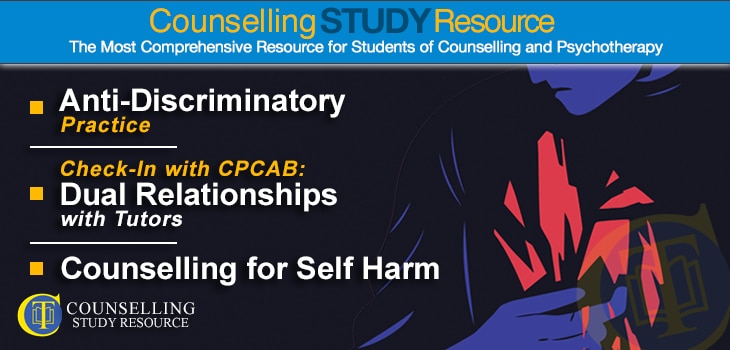140 - Counselling for Self-Harm
Anti-Discriminatory Practice in Counselling - Dual Relationships with Tutors
In episode 140 of the Counselling Tutor Podcast, Ken Kelly and Rory Lees-Oakes discuss discrimination and how to guard against this in your counselling practice. 'Check-In with CPCAB' then looks at the tricky issue of dual relationships between tutors and students. Last, in 'Practice Matters', the presenters explore counselling for self-harm, including the forms that self-harm takes.
* BACPAC practice management software for counsellors and psychotherapists is a sponsor of the Counselling Tutor Podcast.
Get a 30-day free trial of BACPAC and a 30% discount by using the discount code CT2020
Anti-Discriminatory Practice (starts at 1.18 mins)
This topic was raised recently in the Counselling Tutor Facebook group, where you can discuss current topics with 28,000 counselling students, qualified counsellors and counselling tutors.
The Equality Act 2010 outlaws discrimination on the grounds of nine protected characteristics:
- age
- disability
- gender reassignment
- marriage and civil partnership
- pregnancy and maternity
- race
- religion or belief
- sex
- sexual orientation
Personal development groups provide a great opportunity to explore any prejudices that you might have but be unaware of.
Indeed, it is relatively unusual these days to encounter overt discrimination (open and intentional), but there remains much covert discrimination (hidden away, and often unconscious). Rory and Ken share personal anecdotes of discrimination of both these types that they have witnessed.
Do remember that seeing a client as a 'victim' and using that term is a form of discrimination.
When working with clients, it is paramount to enter their frame of reference, using empathy to understand how each client experiences the world. If you can achieve this, you will naturally avoid discrimination (which tends to be a product of seeing the world through our own lens).
Check-In with CPCAB: Dual Relationships with Tutors (starts at 12.42 mins)
In episode 123 of the Counselling Tutor Podcast, Rory spoke to Heather Price (Senior Counselling Professional) at CPCAB (Counselling & Psychotherapy Central Awarding Body) about dual relationships in counselling training.
Heather explained then that this situation occurs when two people who already know each other well outside the classroom (e.g. through being relatives or colleagues) attend the same course.
In this episode, Rory and Heather revisit the topic of dual relationships, but this time look at the potential difficulties when a course tutor is already acquainted with a student in their group either professionally or personally.
Heather explains how this type of dual relationships can be avoided (e.g. through identifying these during the interviewing process) and - if they 'slip through the net' or are unavoidable - what arrangements need to be put in place to ensure ethical working, including assessment procedures and documentation to record potential conflicts of interest.
You can find more information about CPCAB on its website. CPCAB is the UK's only awarding body run by counsellors for counsellors.
Counselling for Self-Harm (starts at 27.15 mins)
Ken and Rory look at what self-harm is - although this tends to be viewed as specific behaviours such as cutting and burning oneself, it can present in many other forms.
For example, Rory describes a rugby player who purposely got himself injured during matches. Substance misuse may also be a type of self-harm.
Self-harm tends to be a way of using physical pain to distract oneself from emotional pain. It is not the same as suicidal behaviour - those who self-harm generally want to live - but a high proportion of people who do attempt suicide have self-harmed in the past.
Self-harm often takes on a cyclical pattern, with people feeling shame, remorse and guilt immediately after self-harming, but then the stresses building again to trigger a further episode.
It is a good idea to seek continuing professional development when providing counselling for self-harm, in order to ensure that you have a good understanding of working with this in the counselling room.
In particular, when doing counselling for self-harm, it is important to understand how to balance client safety (including on avoiding infection while self-harming) with the importance of client trust and the availability of a safe place to bring their emotions.
Here in Counsellor CPD, you can watch this lecture by Rory on counselling for self-harm, and get a downloadable slide pack.
Practice Matters is sponsored by Bacpac, client-management software for counsellors and psychotherapists. Bacpac offers all Counselling Tutor Podcast listeners a 30% discount, which you can claim by visiting the Bacpac website and using the code CT2020.


